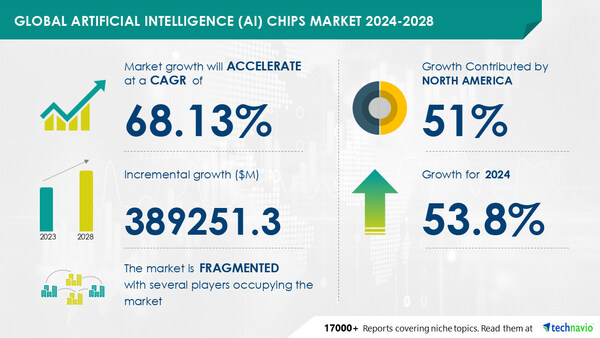NEWS PROVIDED BYTechnavio
Jul 09, 2024, 18:25 ET
NEW YORK, July 9, 2024 /PRNewswire/ — The global artificial intelligence (AI) chips market is estimated to grow by USD 389.25 billion from 2024-2028, at a CAGR of over 68.13%, according to Technavio. Increasing adoption of AI chips in data centers and the convergence of AI and IoT are driving market growth. However, a dearth of technically skilled workers poses a challenge. Key players include Advanced Micro Devices Inc., Alphabet Inc., Baidu Inc., Broadcom Inc., Cerebras, Fujitsu Ltd., Graphcore Ltd., Huawei Technologies Co. Ltd., Intel Corp., and NVIDIA Corp., the leader in the AI chip market.

Get a detailed analysis on regions, market segments, customer landscape, and companies – Click for the snapshot of this report
| Forecast period | 2024-2028 |
| Base Year | 2023 |
| Historic Data | 2018 – 2022 |
| Segment Covered | Product (ASICs, GPUs, CPUs, and FPGAs), End-user (Media and advertising, BFSI, IT and telecommunication, and Others), and Geography (North America, Europe, APAC, South America, and Middle East and Africa) |
| Region Covered | North America, Europe, APAC, South America, and Middle East and Africa |
| Key companies profiled | Advanced Micro Devices Inc., Alphabet Inc., Baidu Inc., Broadcom Inc., Cerebras, Fujitsu Ltd., Graphcore Ltd., Huawei Technologies Co. Ltd., Intel Corp., International Business Machines Corp., MediaTek Inc., Microchip Technology Inc., NVIDIA Corp., NXP Semiconductors NV, Qualcomm Inc., SambaNova Systems Inc., Samsung Electronics Co. Ltd., SenseTime Group Inc., Taiwan Semiconductor Manufacturing Co. Ltd., and Tesla Inc. |
Key Market Trends Fueling Growth
The Internet of Things (IoT) market is experiencing significant growth due to the numerous advantages it offers in various industries, including aerospace and defense, automotive, consumer electronics, healthcare, and others. IoT devices, which include cameras, drones, smart speakers, smartphones, smart TVs, and more, are increasingly integrating Human-Machine Interface (HMI) technologies. This integration leads to the deployment of Artificial Intelligence (AI) chips in IoT devices, enabling power-efficient data processing and machine learning computation. The demand for IoT devices is escalating due to the focus on smart city projects and automation in homes and enterprises. Market players are collaborating to develop software and hardware solutions to integrate AI technology in IoT devices, driving the growth of the AI chips market in the forecast period.
Artificial Intelligence (AI) chips are making waves in various industries by powering innovative applications in personalized health and treatment devices for the elderly population. Machine Learning (ML) and Deep Learning (DL) are driving this trend, with computer vision technologies like pose detection and behavioral pattern recognition becoming increasingly important. Structured data from IoT devices, Industry 4.0 manufacturing, wearable devices, smart homes, and connected cars are fueling this growth. AI chips are being integrated into processors, GPUs, FPGAs, CPUs, ASICs, DSPs, microcontrollers, and programmable logic chips to handle the demands of AI applications. These chips enable high-quality images, animations, and videos in mobile phones, embedded systems, personal computers, gaming consoles, and more. The theoretical and algorithmic basis of AI is being transformed by automatic analysis, extraction, and estimation of single images and sequences of images.
Discover 360° analysis of this market. For complete information, schedule your consultation- Book Here!
Market Challenges
- The AI chips market is witnessing significant growth due to the potential revenue benefits that companies can derive from investing in artificial intelligence. However, the implementation of AI comes with challenges, particularly the shortage of skilled workers with expertise in AI technology. This talent gap poses a major obstacle for enterprises seeking to integrate AI into their operations. The high R&D costs associated with AI and the lack of available talent are hindering the growth of the market. To overcome this hurdle, organizations must prioritize talent acquisition and retention, recruiting professionals with strong technical backgrounds and investing in skill development programs. The shortage of AI engineers and technicians is hindering the deployment of AI in enterprises, thereby limiting market growth during the forecast period.
- The Artificial Intelligence (AI) Chips Market is experiencing significant growth due to the increasing demand for energy-efficient solutions for AI applications in various industries such as healthcare, retail, finance, automotive, and IoT devices. Companies like Nvidia and Huawei are leading the market with their AI chip lines, including the Nvidia A100 chip and Huawei Ascend 910B chipset. However, challenges such as energy efficiency, latency, and ethical concerns remain. Centralized cloud servers from Microsoft Azure, Amazon Web Services, Google Cloud, and Oracle Cloud Infrastructure offer high computing power but face challenges with real-time applications and big data processing. Edge computing and Edge devices are gaining popularity for their ability to process data locally, reducing latency and improving performance. Patent filing and system failure are also concerns for companies investing in AI chips. Specific integrated circuits like CPU, FPGA, GPU, and system on chip, multichip module, and high computing parallel computing are essential for AI data centers, cognitive computing, machine intelligence, image recognition, and other AI applications. Ethical concerns around AI use in mobile applications, health monitoring, and health information access are becoming increasingly important. The market for AI chips is expected to continue growing, with continued innovation and investment in this area.
For more insights on driver and challenges – Download a Sample Report
Segment Overview
This artificial intelligence (AI) chips market report extensively covers market segmentation by
- Product
- 1.1 ASICs
- 1.2 GPUs
- 1.3 CPUs
- 1.4 FPGAs
- End-user
- 2.1 Media and advertising
- 2.2 BFSI
- 2.3 IT and Telecommunication
- 2.4 Others
- Geography
- 3.1 North America
- 3.2 Europe
- 3.3 APAC
- 3.4 South America
- 3.5 Middle East and Africa
1.1 ASICs- Artificial Intelligence (AI) chips, specifically Application-Specific Integrated Circuits (ASICs), are driving innovation in the tech industry. ASICs are customized, non-configurable chips that offer faster performance than GPUs and FPGAs for parallel algorithms. Their use in cloud-based data centers is increasing, as ASIC-based AI chips, like Google’s Tensor Processing Unit (TPU), provide superior speed and efficiency. TPUs, a network of software and hardware, are designed for deep neural networks and can learn specific tasks with large data sets. Data centers are integrating these ASICs into servers to manage data effectively. TPUs have an instruction set that allows TensorFlow programs to be modified, enabling new algorithms to be developed. As an open-source machine learning library, TensorFlow’s data flow graph structure simplifies complex computations, making ASICs a preferred choice for AI applications. The market for ASIC-based AI chips is expected to grow significantly due to their performance advantages.
For more information on market segmentation with geographical analysis including forecast (2024-2028) and historic data (2018 – 2022) – Download a Sample Report
Research Analysis
Artificial Intelligence (AI) Chips Market: The global AI Chips Market is experiencing significant growth due to the increasing adoption of AI technologies in various industries. Deep learning and machine learning algorithms require specialized hardware components, leading to the development of AI chips. These chips are designed to accelerate AI workloads and improve the performance of AI applications. AI chips include specific integrated circuits like CPUs, GPUs, FPGAs, and system on chips. Quantum computing is also emerging as a potential technology to enhance AI capabilities. The market for AI chips is expanding across sectors such as healthcare, retail, finance, automotive, autonomous vehicles, IoT devices, and more. However, ethical concerns surrounding AI and its impact on jobs are raising questions about the future of this technology. High bandwidth memory and Trainium2 chip are some of the advanced hardware components driving the market. The market is segmented into cloud and edge computing, with the edge computing segment expected to grow due to the increasing demand for real-time AI processing.
Market Research Overview
Artificial Intelligence (AI) Chips Market: An Overview The AI Chips Market is witnessing significant growth due to the increasing demand for advanced AI technologies, such as deep learning and machine learning, in various industries. AI chips are specialized hardware components designed to accelerate AI algorithms and technologies, including neural networks, quantum computing, and cognitive computing. These chips are essential for powering AI applications in robotics, computer vision, natural language processing, and generative AI. The market for AI chips includes a range of hardware components, such as CPUs, GPUs, FPGAs, and system on chips, each with unique advantages in terms of energy efficiency, parallel computing, and high computing power. Major applications of AI chips include data processing in centralized cloud servers and edge devices, real-time applications, big data analysis, and AI applications in healthcare, retail, finance, automotive, and IoT devices. Ethical concerns surrounding AI technologies and potential system failures or malfunctioning are also driving the development of more energy-efficient and reliable AI chips. Some of the emerging trends in the AI Chips Market include the development of AI chip lines, such as Nvidia’s A100 chip and Ascend 910B chipset, and H200 chipset, as well as the integration of high bandwidth memory and quantum computing technologies. The market is also witnessing the growth of edge computing and the increasing use of AI in industries such as manufacturing, wearable devices, smart homes, and connected cars. In conclusion, the AI Chips Market is a dynamic and rapidly evolving field, driven by the increasing demand for AI technologies in various industries and the need for more energy-efficient and reliable hardware components. The market is expected to continue growing in the coming years, with new innovations and applications emerging in areas such as healthcare, finance, and autonomous vehicles.
Table of Contents:
1 Executive Summary
2 Market Landscape
3 Market Sizing
4 Historic Market Size
5 Five Forces Analysis
6 Market Segmentation
- Product
- ASICs
- GPUs
- CPUs
- FPGAs
- End-user
- Media And Advertising
- BFSI
- IT And Telecommunication
- Others
- Geography
- North America
- Europe
- APAC
- South America
- Middle East And Africa
7 Customer Landscape
8 Geographic Landscape
9 Drivers, Challenges, and Trends
10 Company Landscape
11 Company Analysis
12 Appendix
About Technavio
Technavio is a leading global technology research and advisory company. Their research and analysis focuses on emerging market trends and provides actionable insights to help businesses identify market opportunities and develop effective strategies to optimize their market positions.
With over 500 specialized analysts, Technavio’s report library consists of more than 17,000 reports and counting, covering 800 technologies, spanning across 50 countries. Their client base consists of enterprises of all sizes, including more than 100 Fortune 500 companies. This growing client base relies on Technavio’s comprehensive coverage, extensive research, and actionable market insights to identify opportunities in existing and potential markets and assess their competitive positions within changing market scenarios.
Contacts
Technavio Research
Jesse Maida
Media & Marketing Executive
US: +1 844 364 1100
UK: +44 203 893 3200
Email: media@technavio.com
Website: www.technavio.com/
SOURCE Technavio




